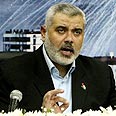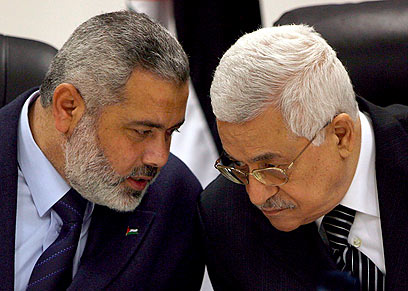
Palestinian Prime Minister Salam Fayyad
Photo: Noam Moskowitz

Hamas Prime Minister Ismail Haniyeh
Photo: Reuters
There are growing signs that the Palestinian Prime Minister Salam Fayyad may be on his way out, as the rival Fatah and Hamas movements prepare to sign a reconciliation deal this week and form a new "unity government."
An ouster of the internationally respected economist could cost the Palestinians hundreds of millions of dollars in Western aid, spell the end of critical US training for Palestinian security forces and endanger an effort to win support for Palestinian statehood at the United Nations.
Future Finances
As new Fatah-Hamas unity deal raises questions over continued Western aid, international body says funds will go to 5,500 families in West Bank, Gaza
"Both Fatah and Hamas don't want Fayyad as prime minister," said Hani Masri, a Palestinian independent who has been mediating between the factions. "Nothing is impossible in politics, but so far Fayyad is not the preference of either side."
Fayyad, 59, has won fans both at home and abroad for his opposition to violence and efforts to lay the groundwork for Palestinian independence. A former International Monetary Fund official with a Ph.D in economics from the University of Texas in Austin, he is credited with rooting out the waste and corruption prevalent during the reign of the late Palestinian leader, Yasser Arafat.
A new poll released Sunday also shows that Fayyad is immensely popular with the Palestinian public. Pollster Faysal Awartani said 58 percent of respondents said they want Fayyad to be head of the new government. He said the telephone poll called 420 people in the West Bank and Gaza and had a margin of error of 5 percentage points.

Palestinian President Abbas and Hamas PM Haniyeh (Photo: EPA)
A political independent, Fayyad took over as prime minister in 2007 after a short-lived unity government between Fatah and Hamas collapsed into civil war.
Since then, he has led a Western-leaning administration in the West Bank, while Hamas, an Iranian-backed militant group committed to Israel's destruction, governed the Gaza Strip. The Palestinians hope to unify both territories, located on opposite sides of Israel, into an independent state.
Enemies within?
The deep division between the rival governments has been a major obstacle to that happening. But last week, with unrest and mass demonstrations sweeping the Arab world, the rival factions announced plans to join in a caretaker government until new elections can be held next year.The plan is to be formally signed on Wednesday and has raised key questions such as who will be the next prime minister. Officials say names won't be discussed until after the signing.
With Hamas considered a terrorist group by Israel and the West, any overt connection to the Islamic group could jeopardize everything the Palestinians have gained in recent years.
Fayyad has overseen a US-backed effort to streamline the Palestinian security forces as well as built new schools, supervised road and public works projects and promoted economic development.
These accomplishments are a key reason why Western donor nations now send nearly $1 billion a year in aid to Fayyad's government.
Fayyad's successes on the global stage, however, have made him many enemies at home, where loyalists of President Mahmoud Abbas accuse the prime minister of stealing the spotlight.
People close to the president confirmed Abbas is not enthusiastic about keeping Fayyad around. But they said he has not made a decision yet, and is aware of how important Fayyad is for the Palestinian cause. They spoke on condition of anonymity because they were discussing a sensitive internal issue.
Gaza's Hamas rulers have long criticized Fayyad as being a lackey of the West. Officials there say retaining Fayyad would be an insult to Gaza's Hamas prime minister, Ismail Haniyeh, who is likely to lose his job.
"There are many faces and leaders who are more credible than Fayyad," said a senior Hamas official in Gaza. "Maybe Fayyad is a professional person, but this is not the time for him to be appointed prime minister." He spoke on condition of anonymity because negotiations have not yet begun.
In a slap at Fayyad, Hamas leader Mahmoud Zahar said in a newspaper interview published Monday that the next prime minister should come from Gaza.
Fayyad took the high road when asked about his future. "That is definitely for the parties to decide," he said. Fayyad said the main focus right now is unity, not who leads the new government.
Despite the sentiments against Fayyad, the Palestinians may ultimately be compelled to retain him. During the previous Fatah-Hamas unity government in 2006 and 2007, the international community cut off aid to the Palestinians because of Hamas' refusal to renounce violence or recognize Israel's right to exist.
Among other names that have been mentioned are Munib Masri, a wealthy Palestinian businessman, and political activist Mustafa Barghouti. Both men are political independents. But Masri is well into his 70s and believed to suffer health problems, while Barghouti has little popular support.
- Follow Ynetnews on Facebook















